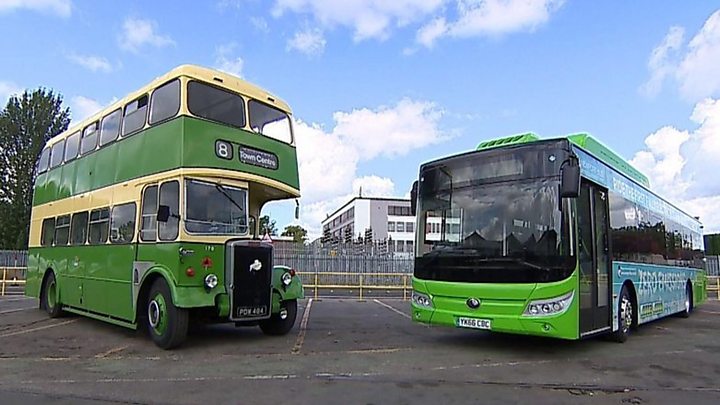
Media playback is unsupported on your device
Wales’ first electric bus will start work on the roads of Newport this week.
Newport Transport has bought a former demonstration bus which will be the first in Wales to be used on a permanent basis.
The city, along with Cardiff and Caerphilly, has won grant funding from a UK government grant scheme to promote greener public transport.
Next year Newport will receive 14 more, Cardiff will receive 36 and 16 will go to Caerphilly.
It follows electric bus trials in Cardiff which began in 2018.
Electric buses produce no emissions but diesel versions produce carbon dioxide and nitrogen oxide.
Newport’s first electric bus is three years old and cost £250,000 compared with the £340,000 cost of buying the vehicles new.
The buses’ batteries need to be replaced every six years and cost £150,000 but Newport Transport has a deal with the energy company Zenobe.
The company continues to own and maintain the batteries and charging systems, and Newport Transport effectively buys the energy off them.
The bus can travel 116 miles (187km) in one charge which the company says will be more than enough for a day’s driving.
It will then be charged overnight at its Newport depot.
Morgan Stevens, operations director at Newport Transport, said: “It improves the quality of experience the passengers will have on the bus.
“It’s a lot quieter – there’s a lot less noise, a lot less vibrations on the engine – which will improve the passenger experience on short and long-distance journeys.”
The company’s managing director Scott Pearson described the opportunity as “massive”.
“The Welsh Government has already declared a climate emergency [and] there are a number of poor air quality zones in Newport that need to be addressed,” he said.
“So the first electric vehicles are going to go on one of those routes – that’s Caerleon and back – that’s got three poor air quality zones in it.”
“With the M4 relief road now not being built, I think bus can offer that alternative of mass transportation and if we do it with electric vehicles, it ticks so many boxes.
“We can carry up to 70 or 80 people on a double-decker. I think it will hopefully reduce the congestion in Newport.”
